- Home
- Salman Rushdie
The Golden House Page 2
The Golden House Read online
Page 2
There was nothing in the house that hinted at their origins, and the four men remained obstinately unwilling to open up about the past. Things leak out, inevitably, and we found out their story in time, but before that we all had our own hypotheses about their secret history, wrapping our fictions around theirs. Even though they were all fairish of complexion, from the milky-pale youngest son to leathery old Nero, it was clear to everyone that they were not conventionally “white.” Their English was immaculate, British-accented, they had almost certainly had Oxbridge educations, and so at first we incorrectly assumed, most of us, that multicultural England was the country that could not be named, and London the multiracial town. They might have been Lebanese, or Armenian, or South Asian Londoners, we hypothesized, or even of Mediterranean European origin, which would explain their Roman fantasies. What dreadful wrong had been done to them there, what awful slights had they endured, that they went to such lengths to disown their origins? Well, well, for most of us that was their private affair, and we were willing to leave it at that, until it was no longer possible to do so. And when that time came, we understood that we had been asking ourselves the wrong questions.
That the charade of their newly adopted names worked at all, let alone for two entire presidential terms, that these invented American personae living in their palace of illusions were so unquestioningly accepted by us, their new neighbors and acquaintances, tells us much about America itself, and more about the strength of will with which they inhabited their chameleon identities, becoming, in all our eyes, whatever they said they were. In retrospect one can only wonder at the vastness of the plan, the intricacy of the details that would have had to be attended to, the passports, the state ID cards, the drivers’ licenses, the SSNs, the health insurance, the forgeries, the deals, the payoffs, the sheer difficulty of it all, and the fury or perhaps fear that drove the whole magnificent, elaborate, cockeyed scheme. As we afterwards learned, the old man had worked on this metamorphosis for perhaps a decade and a half before he put the plan into action. If we had known that, we would have understood that something very large was being concealed. But we did not know. They were simply the self-styled king and his soi-disant princes, living in the architectural jewel of the neighborhood.
The truth is that they didn’t seem so odd to us. People in America were called all sorts of things—throughout the phonebook, in the days when there were phonebooks, nomenclatural exoticism ruled. Huckleberry! Dimmesdale! Ichabod! Ahab! Fenimore! Portnoy! Drudge! To say nothing of dozens, hundreds, thousands of Golds, Goldwaters, Goldsteins, Finegolds, Goldberrys. Americans also constantly decided what they wanted to be called and who they wanted to be, shedding their Gatz origins to become shirt-owning Gatsbys and pursue dreams called Daisy or perhaps simply America. Samuel Goldfish (another golden boy) became Samuel Goldwyn, the Aertzoons became the Vanderbilts, Clemens became Twain. And many of us, as immigrants—or our parents or our grandparents—had chosen to leave our pasts behind just as the Goldens were now choosing, encouraging our children to speak English, not the old language from the old country: to speak, dress, act, be American. The old stuff we tucked away in a cellar, or discarded, or lost. And in our movies and comic books—in the comic books our movies have become—do we not celebrate every day, do we not honor, the idea of the Secret Identity? Clark Kent, Bruce Wayne, Diana Prince, Bruce Banner, Raven Darkhölme, we love you. The secret identity may once have been a French notion—Fantômas the thief, and also le fantôme de l’Opéra—but it has by now put down deep roots in American culture. If our new friends wanted to be Caesars, we were down with that. They had excellent taste, excellent clothes, excellent English, and they were no more eccentric than, say, Bob Dylan, or any other sometime local resident. So the Goldens were accepted because they were acceptable. They were Americans now.
But at last things began to unravel. These were the causes of their fall: a sibling quarrel, an unexpected metamorphosis, the arrival in the old man’s life of a beautiful and determined young woman, a murder. (More than one murder.) And, far away, in the country that had no name, finally, some decent intelligence work.
This was their untold story, their exploding planet Krypton: a sob story, as things kept secret often are.
The grand hotel by the harbor was loved by everyone, even by those too poor ever to pass through its doors. Everyone had seen the interior in the movies, the movie magazines, and their dreams: the famous staircase, the swimming pool surrounded by lounging bathing beauties, the glittering corridors of stores including bespoke tailors who could imitate your favorite suit in an afternoon once you had picked out your preferred worsted or gabardine. Everyone knew about the fabulously capable, endlessly hospitable and deeply dedicated staff for whom the hotel was like their family, who gave to the hotel the respect due to a patriarch, and who made all who entered its hallways feel like queens and kings. It was a place to welcome foreigners, yes, of course, from its windows the foreigners looked out at the harbor, the beautiful bay that had given the unnameable city its name, and marveled at the great array of seagoing vessels bobbing before them, motorboats and sailboats and cruise craft of every size, shape and hue. Everyone knew the story of the birth of the city, how the British had wanted it precisely because of this beautiful harbor, how they had negotiated with the Portuguese to marry the princess Catherine to King Charles II, and because poor Catherine was not a beauty the dowry had to be pretty damn good, especially because Charles II had an eye for a beautiful girl, and so the city was part of the dowry, and Charles married Catherine and then ignored her for the rest of his life, but the British put their navy in the harbor and embarked on a great land reclamation scheme to join up the Seven Isles and built a fort there and then a city and the British Empire followed. It was a city built by foreigners and so it was right that foreigners should be welcomed in that grand palace of a hotel looking out on the harbor which was the whole reason for the city’s existence. But it was not only for foreigners, it was too romantic a building for that, stone-walled, red-domed, enchanted, with Belgian chandeliers shining down upon you, and on the walls and on the floors the art and furniture and carpeting from every part of that giant country, the country that could not be named, and so, if you were a young man wanting to impress your love you would somehow find the money to take her to the lounge facing the sea and as the sea breeze caressed your faces you would drink tea or lime juice and eat cucumber sandwiches and cake and she would love you because you had brought her into the city’s magic heart. And maybe on your second date you would bring her back for Chinese food downstairs and that would seal the deal.
The grandees of the city, and the country, and the world made the grand old hotel their own after the British left—princes, politicians, movie stars, religious leaders, the most famous and most beautiful faces in the city, the country and the world jostled for position in its corridors—and it became as much a symbol of the city that could not be named as the Eiffel Tower, or the Colosseum, or the statue in New York harbor whose name was Liberty Enlightens the World.
There was an origin myth about the grand old hotel which almost everyone in the city that could not be named believed even though it wasn’t true, a myth about liberty, about overthrowing the British imperialists just as the Americans had. The story went that in the first years of the twentieth century a grand old gentleman in a fez, who just happened to be the richest man in the country that could not be named, once tried to visit a different, older grand hotel in the same neighborhood and was refused entry on account of his race. The grand old gentleman nodded his head slowly, walked away, bought a substantial piece of land down the road, and built upon it the finest and grandest hotel ever seen in the city that could not be named in the country that could not be identified, and in a short period of time put out of business the hotel which had refused him entry. So the hotel became, in people’s minds, a symbol of rebellion, of beating the colonizers at their own game and driving them into the sea, and even when it was conc
lusively established that nothing of the sort had really happened it changed nothing, because a symbol of freedom and victory is more powerful than the facts.
One hundred and five years passed. Then, on November 23, 2008, ten gunmen armed with automatic weapons and hand grenades left by boat from the hostile neighboring country to the west of the country that could not be named. In their backpacks they carried ammunition and strong narcotics: cocaine, steroids, LSD, and syringes. On their journey to the city that could not be named they hijacked a fishing boat, abandoned their original vessel, brought two dinghies aboard the fishing boat and told the captain where to go. When they were near the shore they killed the captain and got into the dinghies. Afterwards many people wondered why the coast guard had not seen them or tried to intercept them. The coast was supposed to be well guarded but on this night there had been a failure of some sort. When the dinghies landed, on November 26, the gunmen split up into small groups and made their way to their chosen targets, a railway station, a hospital, a movie theater, a Jewish center, a popular café, and two five-star hotels. One of these was the hotel described above.
The attack on the railway station began at 9:21 P.M., and lasted for an hour and a half. The two gunmen fired indiscriminately, and fifty-eight people died. They left the station and were eventually cornered near a city beach, where one was killed and the other captured. Meanwhile, at 9:30 P.M., another team of killers blew up a gas station and then started shooting at the people in the Jewish center when they came to the windows. Then they attacked the center itself and seven people died. Ten people died at the café. Over the next forty-eight hours perhaps thirty people died in the other hotel.
The hotel that was loved by everyone was attacked around 9:45 P.M. Guests in the swimming pool area were shot first, and then the gunmen went toward the restaurants. A young woman working in the Sea Lounge where young men took their girlfriends to impress them helped many guests escape through a staff door, but when the gunmen burst into the lounge she herself was killed. Grenades were set off and a murder spree followed during what became a three-day siege. Outside there were TV crews and crowds and someone shouted, “The hotel is on fire!” Flames leapt from the windows of the topmost floor and the famous staircase too was ablaze. Among those trapped by the flames and burned to death were the wife and children of the manager of the hotel. The gunmen had blueprints of the hotel’s floor plan and their blueprints were more accurate than those held by the security forces. They used the drugs to stay awake and the LSD—which is not a psychostimulant—combined with the other drugs (which were) to create in the killers a manic hallucinogenic frenzy and they laughed aloud as they killed. Outside, the TV crews reported on escaping hotel guests and the killers watched TV to find out where the guests were escaping from. By the end of the siege over thirty people had died, many of them members of the hotel staff.
The Goldens, under their abandoned original name, lived in the city’s most exclusive neighborhood, in a gated community on the most exclusive hill, in a large modern house overlooking the Art Deco mansions lining the back bay into which the red sun dove headfirst every night. We can imagine them there, the old man, not so old then, and the sons, also younger, the big brilliant clumsy agoraphobic firstborn lummox, the middle one with his night-running ways and his society portraits, the youngest boy with the darkness and confusion in him, and it seems that the game of giving themselves classical names was one the old man had encouraged them to play for many years, just as he taught them from their earliest days that they were not ordinary people, they were Caesars, they were gods. The Roman emperors, and afterwards the Byzantine monarchs, were known by Arabs and Persians as Qaisar-e-Rúm, Caesars of Rome. And if Rome was Rúm, then they, the kings of this eastern Rome, were Rumi. That led them to the study of the mystic and sage Rumi, a.k.a. Jalaluddin Balkhi, whose quotes the father and his sons batted around like tennis balls, what you seek is seeking you, you are the universe in ecstatic motion, be notorious, unfold your own myth, sell your cleverness and buy bewilderment, set your life on fire, seek those who fan your flames, and if you desire healing, let yourself fall ill, until they grew weary of his nostrums and started making them up to make one another laugh, if you want to be rich, make yourself poor, if someone is looking for you, that’s who you’re looking for, if you want to be right side up, stand upon your head.
After that they were no longer Rumi and became Latinate Julii, the sons of Caesar who were or would be Caesars in their own right. They were an old family claiming to be able to trace their ancestry all the way back to Alexander the Great—alleged by Plutarch to be the son of Zeus himself—so they were at least the equal of the Julio-Claudians who claimed descent from Iulus, the son of pious Aeneas, prince of Troy, and therefore from Aeneas’s mother, the goddess Venus. As for the word Caesar, it had at least four possible origins. Did the first Caesar kill a caesai—the Moorish word for elephant? Did he have thick hair on his head—caesaries? Did he have gray eyes, oculis caesiis? Or did his name come from the verb caedere, to cut, because he was born by caesarean section? “I don’t have gray eyes, and my mother gave birth to me in the usual way,” said the old man. “And my hair, though still present, has thinned; nor have I killed any elephants. To hell with the first Caesar. I choose to be Nero, the last one.”
“Who are we, then?” the middle son asked. “You are my sons,” the patriarch said with a shrug. “Choose your own names.” Afterwards, when it was time to leave, they discovered that he had had travel documents made up for them in the new names, and they weren’t surprised. He was a man who got things done.
And here as if in an old photograph is the old man’s wife, a small sad woman with her graying hair up in an untidy bun and the memory of self-harm in her eyes. Caesar’s wife: required to be above suspicion, yes, but also stuck with the worst job in the world.
In the evening of November 26 something happened in the big house, an argument of some sort between Caesar and his wife, and she sent for the Mercedes and the driver and left the house in distress, on her way to seek the consolation of her friends, and that was how she came to be sitting in the Sea Lounge of the hotel that everyone loved, eating cucumber sandwiches and drinking heavily sweetened fresh lime juice, when the hallucinating gunmen burst in giggling with joy, with spiraling eyeballs and psychedelic imaginary birds fluttering around their heads, and began shooting to kill.
And yes, the country was India, of course, the city was Bombay, of course, the house was a part of the luxurious Walkeshwar colony on Malabar Hill, and yes, of course, these were the Muslim terrorist attacks launched from Pakistan by Lashkar-e-Taiba, the “Army of the Righteous,” first on the railway station formerly known as Victoria Terminus or VT and presently, like everything else in Bombay/Mumbai, renamed after the Mahratta hero-prince Shivaji—and then on Leopold Café in Colaba, the Oberoi Trident Hotel, the Metro Cinema, the Cama and Albless Hospital, the Jewish Chabad House, and the Taj Mahal Palace and Tower Hotel. And yes, after the three-day sieges and battles were done, the mother of the two older Golden boys (of the youngest son’s mother we will have more to say hereafter) was numbered among the dead.
When the old man heard that his wife was trapped inside the Taj his knees gave way and he would have fallen down the marble steps of his marble house, from his marble living room to the marble terrace below, if there had not been a servant close enough to catch him, but then there was always a servant. He remained on his knees and buried his face in his hands and his body was racked by sobs so loud and convulsive that it seemed as if a creature hidden deep within himself was trying to escape. For the entire duration of the attacks he stayed in the position of prayer at the top of the marble steps, refusing to eat or sleep, pounding his chest with a fist like a professional mourner at a funeral, and blaming himself. I didn’t know she was going there, he cried, I should have known, why did I let her go. In those days the air in the city felt dark as blood even at high noon, dark as a mirror, and the old man saw himself r
eflected in it and didn’t like what he saw; and such was the force of his vision that his boys saw it too, and after the bad news came, the news that ended their whole life up to that point, the weekend walks around the racecourse with representatives of the great old families of Bombay and the new money people too, squash and bridge and swimming and badminton and golf at the Willingdon Club, movie starlets, hot jazz, all of it gone forever because drowned beneath a sea of death, they went along with what their father said he wanted now, which was to leave this marble place forever, and the broken quarreling city in which it stood, and the whole dirty corrupt vulnerable country as well, their everything which their father now suddenly or perhaps not so suddenly detested, they agreed to obliterate every detail of what it had been to them and who they had been in it and what they had lost: the woman whose husband had shouted at her and so drove her to her doom, whose two sons had loved her, and who had once been so badly humiliated by her stepson that she tried to kill herself. They would wipe the slate clean, take on new identities, cross the world and be other than what they were. They would escape from the historical into the personal, and in the New World the personal would be all they sought and all they expected, to be detached and individual and alone, each of them to make his own agreement with the everyday, outside history, outside time, in private. It did not occur to any of them that their decision was born of a colossal sense of entitlement, this notion that they could just step away from yesterday and start tomorrow as if it wasn’t a part of the same week, to move beyond memory and roots and language and race into the land of the self-made self, which is another way of saying, America.

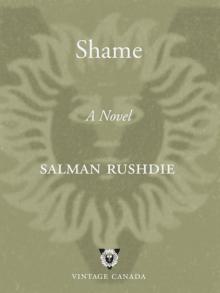 Shame
Shame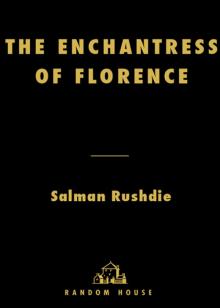 The Enchantress of Florence
The Enchantress of Florence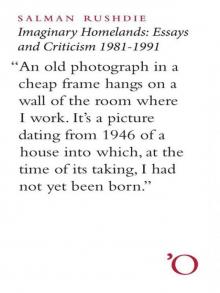 Imaginary Homelands: Essays and Criticism 1981-1991
Imaginary Homelands: Essays and Criticism 1981-1991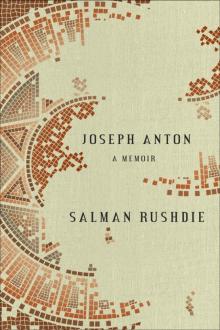 Joseph Anton: A Memoir
Joseph Anton: A Memoir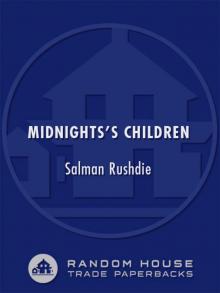 Midnight's Children
Midnight's Children East, West: Stories
East, West: Stories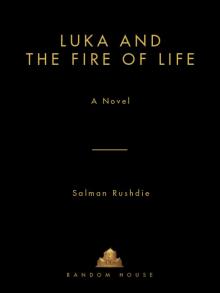 Luka and the Fire of Life
Luka and the Fire of Life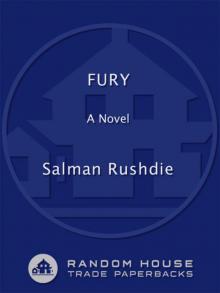 Fury Fury Fury
Fury Fury Fury Haroun and the Sea of Stories
Haroun and the Sea of Stories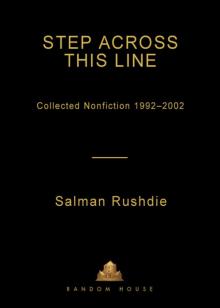 Step Across This Line: Collected Nonfiction 1992-2002
Step Across This Line: Collected Nonfiction 1992-2002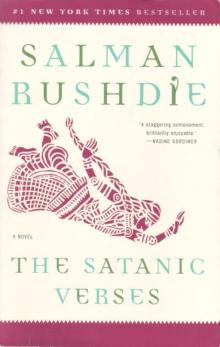 The Satanic Verses
The Satanic Verses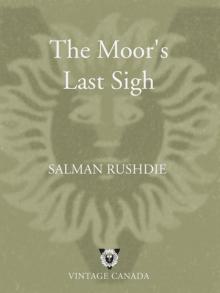 The Moor's Last Sigh
The Moor's Last Sigh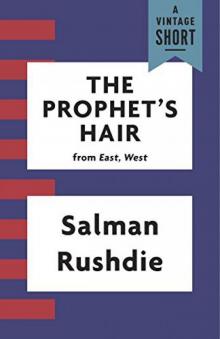 The Prophet's Hair
The Prophet's Hair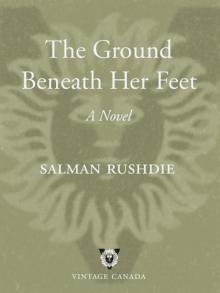 The Ground Beneath Her Feet
The Ground Beneath Her Feet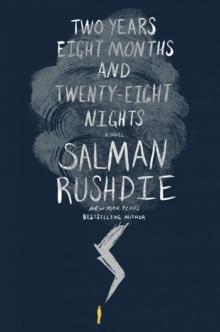 Two Years Eight Months and Twenty-Eight Nights
Two Years Eight Months and Twenty-Eight Nights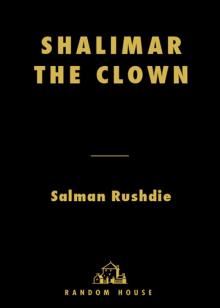 Shalimar the Clown
Shalimar the Clown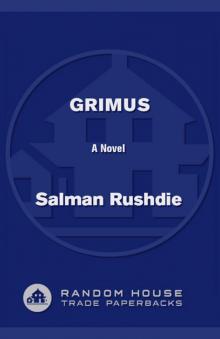 Grimus
Grimus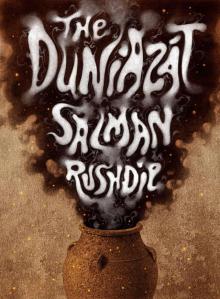 The Duniazát
The Duniazát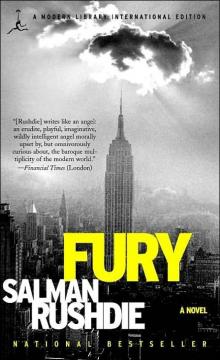 Fury
Fury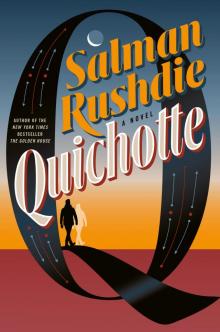 Quichotte
Quichotte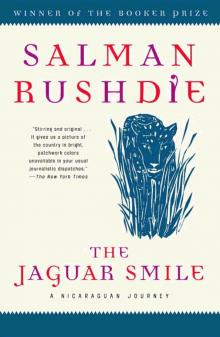 The Jaguar Smile
The Jaguar Smile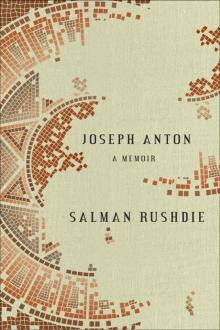 Joseph Anton
Joseph Anton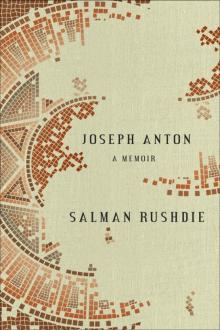 Joseph Anton: A Memoir: A Memoir
Joseph Anton: A Memoir: A Memoir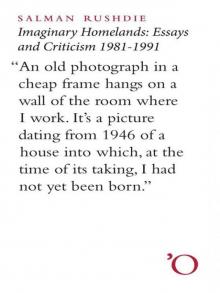 Imaginary Homelands
Imaginary Homelands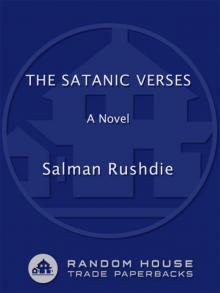 The Satanic Verses: A Novel
The Satanic Verses: A Novel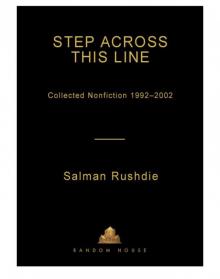 Step Across This Line
Step Across This Line East, West
East, West